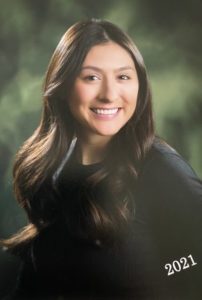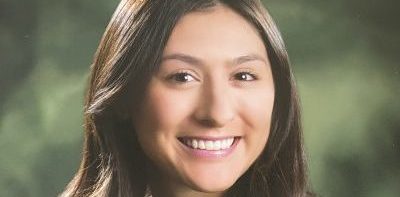
Savannah Padilla
September 21, 2021
Highlands graduate Savannah Padilla said she started thinking about going into medicine when her 5-year-old sister was hospitalized. Helping to care for her much younger siblings and witnessing the limited medical resources in Las Vegas made Padilla aware of how few doctors are from Las Vegas.
“She never got a specific diagnosis, but she did develop sepsis,” said Padilla, remembering her sister’s illness. “It was very frightening. And the pediatrician who treated her is no longer at Alta Vista Hospital. I expect good care for my siblings, so I thought ‘Well, if I expect it, why not try to be it.’”
Padilla said Robertson High School didn’t offer chemistry or biology classes, so it wasn’t until she arrived at Highlands that she encountered science classes.
“When I started at Highlands, I was mostly interested in finding a major where I could help people, so I initially started with psychology,” said Padilla. “When I started my sophomore year at Highlands, I started taking chemistry I and general biology and it was really an eye opener. I really liked how everything intertwined, and I liked chemistry lab and doing weird experiments.”
It was also during her sophomore year that Padilla began to spend a lot of time in the Achieving in Research, Math, and Science—or ARMAS—Center. She said the ARMAS Center was a place she could go to receive tutoring sessions, get help with her writing, and study. It also became a place where she met like-minded students.
“I made a lot of friends who were interested in the same kind of sciences, so that really helped me develop more of a love for it because it became personal,” said Padilla. “I wanted to learn more, so I switched my major to biology.”
Padilla’s personal experiences growing up in Las Vegas and witnessing the high turnover in healthcare providers were also a motivating factor in her course of study.
“I’ve had to switch primary care providers since I was a child,” Padilla said. “So, I decided to work at the hospital as a scribe because I wanted to test the waters and see if I would like interacting with patients.”
As chief scribe at Alta Vista Hospital, Padilla said she continues to witness high turnover and the struggles the hospital has faced in being short staffed during the COVID-19 pandemic.
“I think the ER was a good place to start because, especially in Las Vegas, it’s not always traumas,” said Padilla. “We see a lot of stuff that would be seen in an urgent care, and I see a lot of pediatric cases as well.”
The COVID-19 pandemic hit at the end of Padilla’s junior year at Highlands, but despite the challenges that it posed, Padilla was awarded an IDeA Network of Biomedical Research Excellence, or INBRE, internship with New Mexico State University that she was able to complete virtually. Through this internship, Padilla said she was able to learn how to use bioinformatics software to analyze different countries’ responses to the pandemic.
“Our final project was to use bioinformatics to decipher how some countries were doing so well and some were doing so poorly,” said Padilla.
Under the mentorship of Sebastian Medina, Padilla was also able to participate in two virtual Society of Toxicology conferences during her senior year, where she said she learned about how epigenetics is being studied in mice.
Ultimately, Padilla said she wants to go to school to become a physician assistant. In addition to scribing, she spent her final year at Highlands shadowing El Centro providers Michael Lee, Rose McDonald, and El Centro’s medical director, Matthew Probst, where she received hands-on learning and mentorship. She said the experience gave her the encouragement she needed.
Probst, who helped launch El Centro’s Semillas de Salud program to provide mentorship to young people interested in the sciences, was happy to bring Padilla on board.
“There’s an added benefit of having people from here and having that connection to your people in healthcare,” said Probst. “The probability that someone’s going to come from somewhere else and move here and they fall in love and stay here—the odds of that happening are really low. So, when you have limited resources to invest, you want to invest in the greatest odds, which is that if you can recruit someone from your community, you’re much more likely to retain them. And what do patients want more than anything else, or relationship with their provider.”
Probst, who if featured in the PBS documentary, “The Providers,” inspired Padilla to follow in Probst’s footsteps. Padilla said watching the documentary solidified her desire to return to Las Vegas to help provide care for the community.
“‘The Providers’ showed how in small, rural communities, patients lack resources, like not having a car and not having a way to get to your appointments,” said Padilla. “Until I shadowed him, I wasn’t aware that Dr. Probst didn’t just work in Las Vegas—he works at El Centro in Española and Taos. I want to do that too.”
Probst grew up in Pojoaque and said he’s glad he is able to inspire others to return to their communities, and in turn, he said he suspects Padilla will provide inspiration to others.
“So many times, that personal experience is your motivator, and I think is also makes it real for anybody to say, ‘Well, maybe I want to do that,” said Probst. “There are little kids in this community, and probably in her own family, that look up to Savannah. That’s what I see as the hope: People like Savannah.”
Padilla said she’s waiting to hear back from the 12 physician assistant graduate programs she applied to, including the one at University of New Mexico, which she said is her top choice and the program that Probst also attended.
“I really want to stay close. My main goal is to return to my home community and practice medicine in Las Vegas,” said Padilla. “I know from the hospital that the providers who do work here don’t live here or have a family or life here, and that will be different for me. My love for the place where I grew up inspires me to give back to my home community. I love the people and my family is here.”

